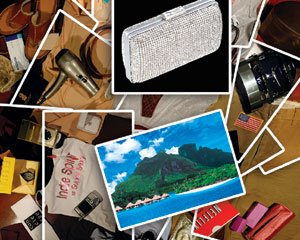 We all heard about it – lavish gift bags are handed out to celebrities at trendy (and therfore newsworthy) events.
We all heard about it – lavish gift bags are handed out to celebrities at trendy (and therfore newsworthy) events.Attending art show openings, Broadway premiere parties, Emmy/Oscar/Golden Globe award shows enables red carpet attendees to leave with heaps of great products – free of charge.
The difference between these gift bags (also called "swag") and regular merchandise is that its purpose is not to make a profit, but to promote the product, and reward its endorsers by giving them something cool and unique. It’s a form product placement.
Chosen celebreties are also invited to gift lounges where they can carry off any product that tickles their fancy – without paying of course.
And if you are an A-list star, you can even demand that the organizers (e.g. the Motorola lounge at the Sundance Film Festival) supply you with your favorite product.
Companies want to put their products in front of celebrities and then create a photo opportunity with those stars.
Once the likes of Paris Hilton are photographed with a certain product, the company expects demand and sales to increase.
Therefore, the goodies are not transferable.
As Nathalie Dubois of Diamond Lounge puts it:
"We don't do agents, publicists or celebrity assistants.
We gift everyone well, but they have to be there with their talent."
Celebrities are expected to wear the jewelry in public and announce how great it is.
A good example of this kind of trade-off is Hilary Swank, wearing Chopard to the Golden Globes and several other events declaring:
"I’m so glad that I wore Chopard earrings, they brought me good luck."
But how effective it?
It has now come to a point that celebrities are not only expecting, but are demanding freebies – often adding up to thousands of dollars worth of merchandise.
Goodies include jewelry, perfume, sunglasses, cosmetics, cosmetic treatments such as Botox, massages, vacations and electronics (anywhere from cell phones and iPods to 103-inch plasma TVs).
As a result, the whole gift bag/lounge industry is
 over-saturated.
over-saturated.It has lost its strength as an advertising tool.
Companies such as M.A.C. cosmetics, Palm Pilot and Roomba are cutting down or opting out.
It also doesn’t come cheap.
Needless to say, companies have to pay for the privilege to be included in the gift bag.
Lash Fary, owner of Distinctive Assets, charges up to $20,000 for firms to be included in his gift bags.
This fee doesn’t include the value of the “gift” itself.
To give you an idea: the Grammy gift basket was worth about $ 65,000; the Oscar’s one about $ 100,000.
Another problem: some megastars just will not play the game.
"The real big celebrities are more concerned about privacy than getting free stuff," says Jen Mayer, spokeswoman for the Frederic Fekkai suite.
"And they can get all these (stylists) to come to their homes."
Some celebrities also don’t want it to be known what they will get free of charge.
"It has become annoying to some people that we give out these baskets," says Academy spokesman John Pavlik. "So we don't talk about them."
Mmmm, that doesn’t seem to play the PR card very well.
And then there are the celebrities who refuse freebies.
Glenn Close attended the 2005 Golden Globes in her own dress and not in a designer donated one.
Keanu Reeves turned down his freebies (including a plasma TV screen) at the Sundance Film festival.
The gift bag industry tried to save some impact by having a charity element.
It gives it a nice ethical touch and ensures that celebrities look more favorably at the freebies.
The latest trend: auctioning off your swag bag for charity.
Oscar winner George Clooney has donated his 78th Annual Academy Awards Oscar gift bag (including a BlackBerry 8700c, a Kay Unger kimono and a cultured Tahitian-pearl necklace) to be sold in an online auction to benefit the United Way Hurricane Response and Relief Recovery Fund.
But most importantly, the public (including the target group the company wants to reach) gets fed up with six-figure salary stars receiving free gift bags worth thousands of dollars in jewelry, travel, clothes and other goodies.
According to experts, a savvy celebrity can rake in close to $1 million in gifts and prizes in the week before the Oscars.
(This may come with its own price tag though - according to Lee Shepperd, contributing editor to the journal Tax Notes of the New York Times, the IRS might view these items not as "gifts," but as "income".
And to top it off, some celebrities have the nerve to snub the contents of their gift bag.
Paris "that's hot" Hilton labeled her $6,000 VH-1 2004 goody bag (that included Cartier sunglasses, an Avita cashmere poncho and a Surly girl clutch) as “lame”.
What started in 1988 as an effective marketing and PR tool has lost is impact.
No comments:
Post a Comment